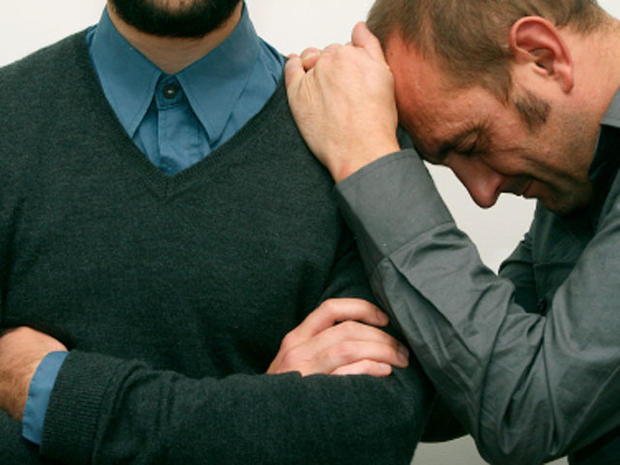Homophobia may reveal denial of own same-sex attraction, study suggests
(CBS News) Do homophobic people actually fear their own unconscious feelings? A new study suggests that people who repress their own sexual attraction to the same sex are more likely to express hostility towards gays.
"In many cases these are people who are at war with themselves and they are turning this internal conflict outward," study co-author Dr. Richard Ryan, professor of psychology at the University of Rochester, said in a university written statement.
In four separate experiments conducted in the U.S. and in Germany, each involving an average of 160 college students, researchers attempted to measure any differences between what people say about their sexual orientation and how they actually react. Their findings are published in the April issue of the Journal of Personality and Social Psychology.
Dan Savage talks dating, sex and relationships on "Savage U"
Same-sex marriage boosts gay men's health, study suggests
For one experiment, researchers used word and picture tests to subliminally prime participants with either the word "me" or "others," and then asking them to place the words and images into "gay" or "straight" categories. A second experiment had participants browse same-sex or opposite-sex photos to test implicit - or unconscious - same-sex attraction. Other experiments measured participants' levels of homophobia through questionnaires or asked about participants' upbringings and their parents' perspectives.
All together, the study showed that participants with parents accepting of homosexuality were more open and aware of their implicit sexual orientation, while those with authoritative parents were more likely to deny their implicit sexual orientation. The researchers found participants who said they were heterosexual but revealed different reactions on their implicit tests were more likely to act with hostility toward gay people.
"In a predominately heterosexual society, 'know thyself' can be a challenge for many gay individuals. But in controlling and homophobic homes, embracing a minority sexual orientation can be terrifying," study co-author Dr. Netta Weinstein, lecturer at the University of Essex, said in the statement. These people risk losing the love and approval of their parents if they admit to same-sex attraction, Weinstein said - so it's easier for them to deny or repress that part of themselves.
The researchers say their study is the first to show the role both parenting and sexual orientation play in the formation of the intense and visceral fear that is homophobia.
"Sometimes people are threatened by gays and lesbians because they are fearing their own impulses, in a sense they 'doth protest too much,'" Ryan told LiveScience. "In addition, it appears that sometimes those who would oppress others have been oppressed themselves, and we can have some compassion for them too, they may be unaccepting of others because they cannot be accepting of themselves."
These studies may also shed some light on gay hate crimes, according to the researchers. People in denial of their sexual orientation often perceive threats from homosexuals and are therefore more disposed to lash out at them, the researchers said. They mention the 1998 murder of Matthew Shephard and the 2011 shooting of Larry King as possible examples.
The findings may also explain surprising cases in which prominently anti-gay activists are caught engaging in same-sex relations, such as when evangelical preacher Ted Haggard was caught in a 2006 sex scandal, the authors said.
"We laugh at or make fun of such blatant hypocrisy, but in a real way, these people may often themselves be victims of repression and experience exaggerated feelings of threat," Ryan said in the statement. "Homophobia is not a laughing matter."
Here is Dr. Ryan explaining more about his research:
